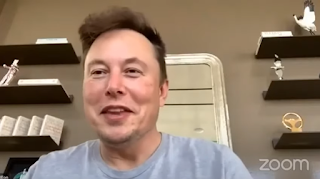Musk predicts high-volume, re-usable Starhip flights in 2022 -- each capable of launching 400 up to Starlink satellties.
Elon Musk was interviewed during the virtual convention of the Mars Society. The interview covered SpaceX technology and management and space travel. I'll summarize some of the former here and recommend taking the time to watch the full 55-minute interview.Achieving that goal requires getting a lot of tonnage to Mars, so expendable rockets are a joke, a waste of time. Fairings too.
Scale matters -- large rockets are efficient. Avionics for a large rocket are no larger than for a small rocket and you gain gauge advantages with size -- you can afford thicker, more accurate castings and skins on a large rocket. (The same goes for trucks and ships).Their current Falcon 9 is close to a local maximum for a kerosene-burning rocket which is limited to a 12-foot diameter because of road transport constraints and its length is constrained by the skin thickness required to avoid bending.
Methane is a better fuel than kerosene -- a rocket goes further if it shoots gas out the end faster and a bigger percentage of its mass is propellant. Furthermore, oxygen is cheap and you can go to a higher oxygen/propellant ratio with methane and you can make both oxygen and methane on Mars.
He gave some timetable guesses with the caveat that they assume exponential innovation:
- 80-90% confident of reaching orbit with Starship next year.
- 50-60% confident of ship and booster reuse next year.
- High volume flights in 2022 -- each capable of launching up to 400 Starlink satellites.
- Refuel in orbit in 2022.
- Two or three years for a moon ship -- after refueling in orbit.
- An un-crewed Mars mission in maybe four years (at the time of the second Mars transfer window from now).
The above assume a non-linear rate of innovation. When asked what makes SpaceX so innovative, Musk first said "I don't really know," but went on to credit having ambitious sub-goals like:
- Full and rapid reuse.
- Orbital refueling.
- Propellent production on Mars.










No comments:
Post a Comment